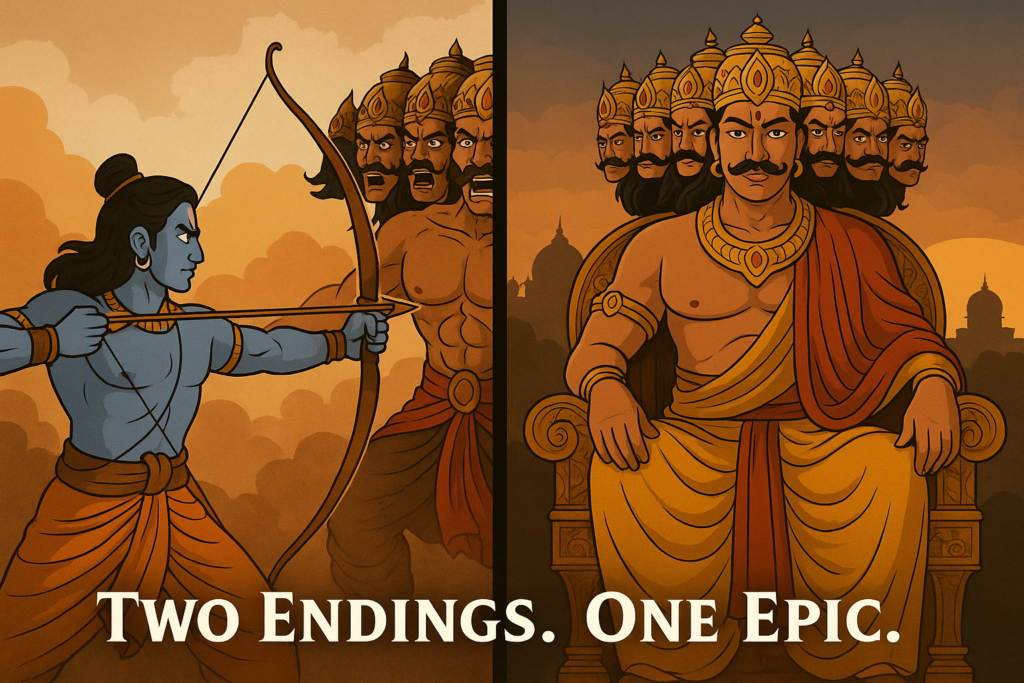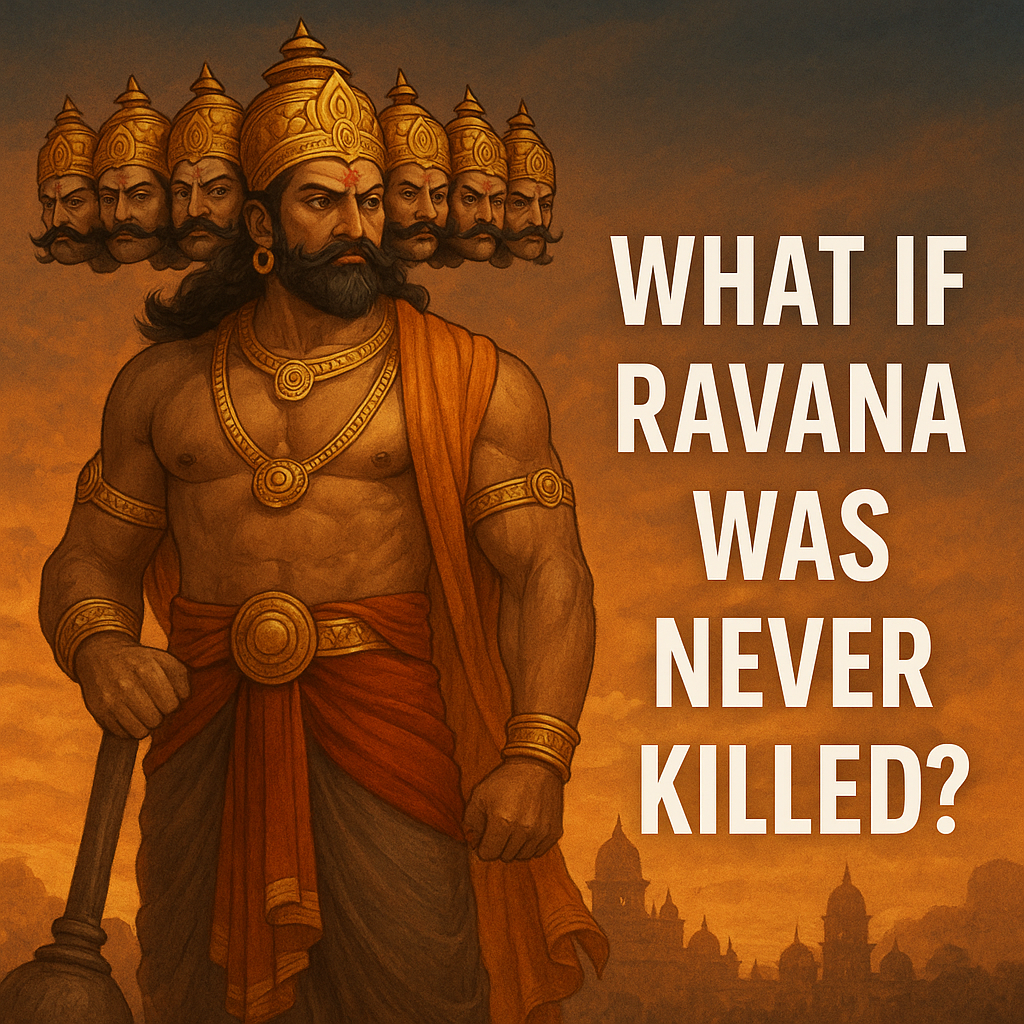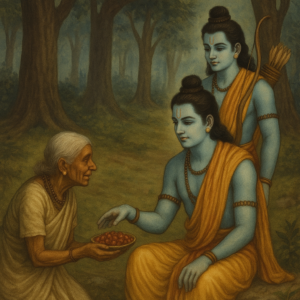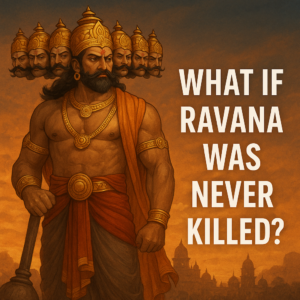Imagine a world where the mighty Ravana still ruled Lanka. What would our epics, morals, and history look like?
What If the Demon King Had Won?
We’ve all grown up hearing the story of Ramayana—how Lord Rama, the ideal man and a symbol of dharma, defeats the ten-headed demon king Ravana, rescues Sita, and brings peace to the world.
It’s a story deeply rooted in Indian culture, celebrated every year during Dussehra and Diwali.
But… have you ever paused for a moment and thought,
👉 “What if Ravana was never killed?”
👉 “What if the story had a different ending?”
It’s a crazy thought, right? But also an exciting one.
Imagine a world where Ravana, the king of Lanka, wins the battle.
Rama fails.
Sita is never rescued.
And Ravana continues to rule from his golden throne.
How different would our world look?
Would Ravana be worshipped as a hero?
Would festivals change?
Would our very idea of right and wrong shift?
In this blog, we’re diving deep into this alternate reality—a world where Ravana lives.
And trust me, it’s going to blow your mind.
Let’s step into a “what-if” world that challenges everything we thought we knew about good, evil, and everything in between.

⚠️ Disclaimer
This article is a work of imaginative storytelling based on Indian mythology. It is not intended to question or challenge anyone’s religious beliefs or sentiments.
Our aim is to explore a creative “what-if” scenario and encourage thought and discussion about the depth and complexity of our epics.
We deeply respect all faiths, characters, and traditions associated with the Ramayana and Indian culture.
1. Lanka Would Be the Power Capital of the World
If Ravana had survived the war with Rama, Lanka wouldn’t just be a kingdom in a myth—it could have become the world’s most powerful empire.
Even in the Ramayana, Lanka is described as a city of gold, filled with wealth, advanced technology, flying machines like the Pushpak Viman, and brilliant architecture that even modern cities can’t compete with.
Ravana wasn’t just a demon king—he was a master strategist, scholar, and a ruler with unmatched intelligence. Under his leadership, Lanka had already grown into a powerful kingdom, feared and respected by both gods and humans.
Now imagine if he had won the battle and lived longer…
- Lanka could’ve expanded its empire across Bharat (ancient India), the Himalayas, and beyond.
- Other kingdoms like Ayodhya, Mithila, or Kashi might have become vassal states or rivals constantly fighting for survival.
- The center of politics, economy, and culture could have shifted from northern India to the southern seas of Lanka.
Instead of Ram Rajya being the ideal of governance, we might have heard stories of “Ravan Rajya”—a land of prosperity, fear, and discipline.
👉 Would India’s political map look completely different today?
👉 Would the world admire Lanka the way we now admire Rome, Athens, or Babylon?
It’s very possible.
Even today, some versions of the Ramayana in Southeast Asia and parts of India don’t always portray Ravana as entirely evil. He was a Shiva devotee, a brilliant Veena player, and a man of immense knowledge.
If he had survived, his version of “order” and power could have shaped civilizations, not just stories.
In this alternate reality, Lanka would be the global capital—of power, magic, and influence. Not a myth, but a mighty empire that rewrote history.
2. Dharma Would Be Redefined—By Asuras
In the Ramayana, Rama represents dharma—truth, justice, and the ideal path. Ravana, on the other hand, is shown as the face of adharma, the one who went against the rules of righteousness.
But let’s flip the script.
👉 What if Ravana had lived?
👉 What if the so-called villain became the ruler of the world?
Then the entire concept of right and wrong would be redefined—through the eyes of the Asuras.
Let’s understand this: Ravana was not your typical villain.
He was a Brahmin by birth, a devotee of Lord Shiva, and a highly educated scholar who had deep knowledge of the Vedas, music, and astrology.
Yes, he made grave mistakes—like abducting Sita—but his rule over Lanka was firm, prosperous, and fearlessly independent from Deva control.
If he had won the war:
- The rules of morality might have changed. What we now see as “evil” (Asura ways) might have become the new normal.
- Ravana’s values—intellect, pride, control, and dominance—would replace humility, service, and sacrifice as the traits to aspire to.
- We could’ve seen Asura codes of law and spirituality being followed across the land instead of the traditional Vedic dharma.
Imagine kids growing up listening to stories that glorify Ravana’s ten heads as symbols of genius, rather than ego.
Temples dedicated to Ravana might teach Asura philosophy, where knowledge and power justify actions, even if they seem harsh.
And what about sages and saints?
Many Rishis were tormented by Asuras in the epics. If Ravana ruled, their influence might have faded, replaced by power-hungry mystics and black magic practitioners.
Spirituality could have taken a darker, more aggressive tone.
This alternate reality opens up a powerful question:
👉 Is dharma universal, or is it written by the victor?
If Ravana had lived, dharma as we know it would be completely different—with Asuras leading the way, not the Devas or their avatars.
3. Ramayana Would Become a Tragedy, Not a Triumph
In our world, the Ramayana is a story of victory—of good over evil, of Rama over Ravana, of dharma over adharma. It’s a tale that gives us hope, strength, and the belief that truth always wins in the end.
But if Ravana had never been killed, everything would flip.
The Ramayana, as we know it, would turn into a heartbreaking tragedy.
Imagine this:
- Rama fails to defeat Ravana.
- Sita remains a captive in Lanka.
- Lakshmana and the Vanara army are crushed.
- Ravana returns to his golden throne, stronger than ever.
👉 Suddenly, Rama is not a victorious king, but a fallen warrior.
👉 His journey ends in loss, not glory.
👉 His name is remembered not with celebration, but with sorrow.
Instead of being sung in temples and festivals, the story of Rama might have become a warning tale—of how even the noblest prince can lose when faced with overwhelming power.
In this alternate timeline:
- No Dussehra, no effigies of Ravana being burned.
- No Diwali, since there’s no joyful return of Rama to Ayodhya.
- Plays like Ramlila might have been replaced by songs of Ravana’s conquest.
The Ramayana would be retold like a Shakespearean tragedy—one where the hero does everything right but still doesn’t win.
He walks into battle with values and love in his heart, but the world bows down to power, intellect, and war machines.
Even the future would change:
- Rama, who was seen as Maryada Purushottam (the ideal man), might fade into legend.
- His teachings and values could be seen as naïve or outdated, not as ideals to follow.
- Ravana’s legacy would dominate, teaching that strength wins, not virtue.
It’s chilling to think how much just one twist—Ravana surviving—could turn an epic of hope into one of grief and loss.
4. Sita’s Fate Could Have Been Darker
In the Ramayana we know, Sita is rescued by Rama after a long, emotional battle. Her strength, purity, and patience inspire millions even today.
But if Ravana had never been killed, Sita’s story would have taken a far more tragic turn.
Let’s be honest—Ravana didn’t just kidnap Sita out of lust. He wanted to prove his superiority over Rama. Despite keeping her in the beautiful Ashok Vatika and not touching her without consent, he still held her prisoner against her will.
Now imagine:
👉 Rama is defeated.
👉 The Vanara Sena is gone.
👉 No one is coming to save her.
What would happen to Sita then?
- She might be forced into marriage with Ravana as a political move to show dominance over Rama.
- Or worse, she could spend the rest of her life as a captive queen—trapped in a golden cage, alone and powerless.
- Her virtues, which are celebrated today, might be forgotten or questioned in a world where Ravana writes the history.
In this alternate version:
- We might never hear about the Agni Pariksha (trial by fire), because Sita would never get the chance to prove her purity.
- Instead of being worshipped as a goddess, Sita might be remembered as a tragic figure—a queen who was never rescued.
- In feminist retellings, her story could be even more powerful—representing resilience without rescue, or the voice of a woman lost to the politics of power.
Sita’s fate, in a Ravana-ruled world, reminds us how the destiny of even the strongest individuals can change based on who wins the war.
It would be a darker version of the epic—one where a woman of incredible strength and purity becomes a silent victim of conquest.
5. The Entire Epic Universe Would Shift
The Ramayana isn’t just one story. It’s a central piece of the larger puzzle that includes the Mahabharata, Puranas, and countless other scriptures. If Ravana had never been killed, the ripple effect would go far beyond one battle—it could shake the foundations of the entire epic universe.
Let’s break it down.
The Balance Between Good and Evil Would Collapse
In Hindu mythology, the universe survives through the balance of dharma and adharma.
Ravana’s defeat was necessary to restore that balance.
But if he had lived and continued ruling:
- Evil wouldn’t just survive—it would thrive unchecked.
- Other Asura kings and demonic forces might rise, inspired by Ravana’s victory.
- Even the Devas (gods) might go into hiding or lose their divine influence on Earth.
Vishnu’s Avatars May Have Played Out Differently
Rama is the seventh avatar of Lord Vishnu. Each avatar comes to Earth to fix a cosmic problem.
If Rama fails in his mission:
- Would Krishna still come in the Mahabharata? Or would a more powerful avatar be forced to appear earlier to defeat Ravana?
- The timeline of cosmic events might get disrupted.
- The idea of divine justice would weaken, and faith in avatars could be questioned by future generations.
Scriptures, Stories, and Morals Would Be Rewritten
The Ramayana has shaped art, music, values, and storytelling for over 2,000 years. But in this alternate reality:
- New versions of the epic would emerge—“Ravanayana” instead of “Ramayana.”
- Ravana’s lineage would be celebrated. His sons like Indrajit might go on to become heroes.
- Instead of teaching children about Rama’s humility and Sita’s patience, stories would glorify Ravana’s strength, intellect, and ambition.
Cultural and Regional Shifts Across Asia
Ramayana is not just Indian—it has versions in Thailand, Cambodia, Indonesia, Nepal, and more.
Rama is a global hero.
But in this world:
- Ravana might be the one with temples across Asia.
- Festivals, traditions, even names of cities or landmarks could honor him.
- The cultural narrative of good vs evil might be blurred or reversed.
In short, everything we know about Indian epics, spiritual teachings, and cosmic order would shift—like a domino effect triggered by just one event: Ravana’s survival.
It’s not just about changing one ending. It’s about rewriting an entire belief system.
6. Ravana: From Villain to Visionary?
Let’s be honest—Ravana isn’t your average villain. He’s one of the most complex and fascinating characters in Indian mythology. Yes, he kidnapped Sita and challenged Rama, but he was also a scholar, a ruler, a devotee, and a genius.
So if Ravana had never been killed, could he have gone from being feared… to being revered?
A Scholar King with Ten Heads of Knowledge
Ravana’s ten heads are said to symbolize his mastery over ten kinds of knowledge—from the Vedas and music to astrology and weaponry. He wasn’t just powerful in war; he was intellectually unmatched.
- In a world where he ruled, people might study his philosophies, not condemn them.
- His books like the Ravana Samhita (on astrology) would become mainstream texts.
- He might be remembered as a visionary king who challenged the gods and dared to change fate.
Temples and Tributes Instead of Effigies
Right now, Ravana is burned every year on Dussehra as a symbol of evil.
But if he had won?
- Temples dedicated to Ravana might stand tall across the country.
- His ten heads would be seen not as symbols of ego, but of intellect, ambition, and brilliance.
- Annual festivals could celebrate his victories, wisdom, and devotion to Lord Shiva.
Interestingly, some parts of India like Mandsaur (Madhya Pradesh) and Kakinada (Andhra Pradesh) already have Ravana temples, where he is respected. This alternate future would simply make such views mainstream.
History often tells us that heroes are those who win, but also those who control the narrative.
If Ravana had lived:
- His side of the story would dominate.
- His actions might be justified through logic, strategy, or political wisdom.
- Ramayana might be rewritten as Ravanayana—his version, his voice.
He could be seen not as a demon who fell to pride, but as a misunderstood visionary who aimed to challenge divine hierarchy and build an empire led by knowledge and power.
The Fine Line Between Good and Evil
Ravana’s survival forces us to face an uncomfortable truth:
👉 Was he truly evil, or just on the losing side of history?
👉 Do our heroes remain heroes only because they won?
In this alternate world, Ravana becomes a reminder that the line between villain and visionary is often drawn by fate—and by who writes the story.
Conclusion: When the Demon Becomes the Ruler of Destiny
The idea of Ravana surviving the Ramayana isn’t just a fun “what-if” scenario—it’s a deep, thought-provoking alternate reality that shakes the foundation of everything we believe about good, evil, power, and destiny.
If Ravana had never been killed…
- Lanka could have ruled the world.
- Dharma would be rewritten.
- Rama’s story would become a tragedy.
- Sita’s voice might echo in silence.
- And Ravana—yes, Ravana—might have been remembered as the greatest king of all time.
But more importantly, this alternate world forces us to reflect on our present.
👉 Is victory the only measure of virtue?
👉 Would we still worship Rama if he had lost?
👉 Do we call Ravana evil because of his deeds—or because he lost?
In the end, mythology is not just about what happened, but about why we tell certain stories over others.
And maybe, just maybe, there’s a Ravana in every one of us—brilliant, flawed, ambitious, and misunderstood.
The only difference?
Who gets to tell the story.


